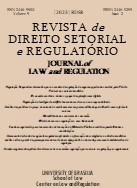Decision-Making autonomy of federal regulatory agencies and the formation of collegiate bodies in Brazilian Law
Critical analysis based on the assumptions of public choice theory and administrative process theory of regulation
Keywords:
Decision-making autonomy of regulatory agencies. Process for nominating directors. Public choice theory. Capture risk. Administrative process theory of regulation.Abstract
[Purpose] This article seeks to critically examine, based on the assumptions of the theory of public choice and the administrative process theory of regulation, the legal arrangement envisaged to ensure decision-making autonomy for federal regulatory agencies, especially based on the model envisaged for the process of appointing their leaders.
[Methodology/approach/design] On the one hand (descriptive), public choice theory, according to the methodology parameters of Duncan Black, Kenneth Arrow, Anthony Downs, James Buchanan, Mancur Olson, William Niskanen and George Stliger, despite not being a regulatory capture theory, allows envision the possibility that, in some cases, the “acquisition” of regulation by special interest groups and/or by political power may occur. On the other hand (normative), administrative process theory of regulation, from the perspective of Steven P. Croley, helps to understand the environment employed within the scope of regulatory agencies to make their decisions, especially with regard to procedural and institutional guarantees they seek ensure decision-making autonomy to the regulator, so that, with this, the risks of capture are avoided or reduced, which would consist of dysfunctional behavior incompatible with conceptions of law and public interest that inform the production of state acts, as it occurs with economic regulation. In this context, the process of appointing the directors of regulatory agencies will be critically evaluated, considering the current political monopoly of this activity and the possible repercussions for the decision-making autonomy of federal agencies.
[Findings] The research indicates that, despite the institutional and procedural progress existing in Brazilian law, it would still be possible (and even desirable) to promote new improvements, especially to reduce political power in the formation of collegiate bodies of regulatory agencies.
Downloads
References
ARANHA, M. I. Manual de Direito Regulatório. 5ª ed., Londres: Laccademia, 2019a.
ARANHA, M. I. Teoria Jurídica da Regulação: entre Escolha Pública e Captura. Direito Público, v. 16, nº 90, p. 11-37, 2019b.
ARROW, K. J. Social Choice and Individual Values. 2. ed. New York: John Wiley & Sons, 1963.
BLACK, D. On the Rationale of Group Decision-Making. Journal of Political Economy, v. 56, p. 23-34, 1948.
BUCHANAN, J. M.; TULLOCK, G. The Calculus of Consent: Logical Foundations of Constitutional Democracy. Ann Arbor: University of Michigan Press, 1962.
CROLEY, Steven P. Regulation and Public Interests: The Possibility of Good Regulatory Government. Princeton: Princeton University Press, 2008.
DOWNS, A. An Economic Theory of Political Action in a Democracy. Journal of Political Economy, v. 65, n. 2, p. 135-150, 1957.
JUSTEN FILHO, Marçal. Curso de Direito Administrativo. São Paulo: Saraiva, 2005.
LOPES, O. A. Fundamentos da Regulação. Rio de Janeiro: 2018.
MORAES, Alexandre de. Agências Reguladoras. Fórum Administrativo: Direito Público, ano 1, nº 08, outubro de 2001, Belo Horizonte.
NISKANEN, W. A. The Peculiar Economics of Bureaucracy. The American Economic Review, v. 58, n. 2, p. 293-305, May 1968.
OLSON, M. L. The Logic of Collective Action: Public Goods and the Theory of Groups. 20. ed. Cambridge, MA: Harvard University Press, v. Harvard Economic Studies, Volume CXXIV, 2002.
PEACOCK, A. Public Choice Analysis in Historical Perspective. Milano: Cambridge University Press - Raffaele Mattioli Foundation, 1997.
ROSE-ACKERMAN, S.; LINDSETH, P. L. (Eds.). Comparative Administrative Law. Cheltenham, UK: Edward Elgar, 2010.
STIGLER, G. J. The Theory of Economic Regulation. The Bell Journal of Economics and Management Science, v. 2, n. 1, p. 3-21, Spring 1971.
Downloads
Published
How to Cite
Issue
Section
License
Copyright (c) 2023 Journal of Law and Regulation

This work is licensed under a Creative Commons Attribution 4.0 International License.
By submitting this paper to the Journal of Law and Regulation, I hereby declare that I agree to the terms of the Creative Commons Attribution 4.0 International (CC BY 4.0), available at http://creativecommons.org/licenses/by/4.0.


